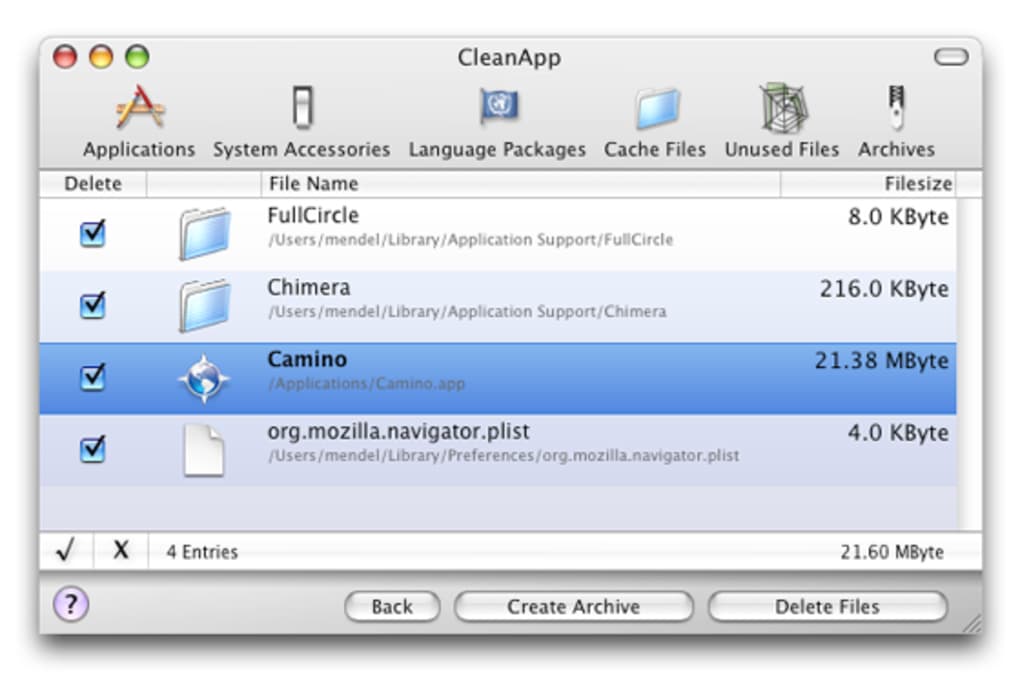

When I send a kill signal to Polipo, it exactly acts as on Linux using init.d. With the first method on Haiku (the method which prevents to definitively quit polipo), the following: Which quit and immediately restart polipo. Some typical uses of a DaemonSet are: running a cluster storage daemon on every node running a logs collection daemon on every node running a node monitoring daemon on every node In a simple case, one DaemonSet, covering all nodes, would be used for each type of daemon.
#Cleanapp launch daemon software
Last updated: OctoDeveloper: Avis Nocturna Software License: Free to Try OS: macOS File size: 60.0 MB. Deleting a DaemonSet will clean up the Pods it created.
#Cleanapp launch daemon for mac
However: I also running polipo on Linux, and sometimes (eg when I apply changes to polipo's config files - or when I add some site to block inside the "forbidden file") I do a CleanApp for Mac Download TechSpot means tech analysis and advice you can trust. Is properly quitted and no longer hangs at reboot/shutdown (previously, when I attempted to kill polipo, it was immediately restarted). It still hangs at reboot/shutdown, but now, If i send a kill signal to polipo (I add the log file to investigate about the issue, unfortunately without any hints) Launch /system/bin/polipo logFile="/var/log/polipo.log" I partially solved launching polipo in this way: Inside the syslog I don't see anything related to polipo or to the launch_daemon. I properly set the signature for polipo "application/x-vnd.Polipo-Proxy". I also tried to make a shutdown script where I try to pass the command "kill polipo", but the situation is always the same. Now, instead, I made a configuration file called "polipo", placed inside /boot/system/data/user_launch with the following content:Įverything works fine except for the fact that when I attempt to reboot or shutdown Haiku, an alert window told me that "polipo might be blocked on a modal panel during shutdown". bin/launchctl bootstrap system /Library/LaunchDaemons/ $ & /bin/launchctl start /Library/LaunchDaemons/ $, as I've said in the subject of this ticket, I'm currently using the launch daemon to run an app at startup: polipo proxy, a cli app īefore of the introduction of the launch daemon, I usually launch polipo using a bash script placed in /boot/home/config/settings/boot/launch. # report to policy whether ownership and permissions were setĮcho "Setting correct ownership and permissions on launch daemon "Įcho "Failed setting correct ownership and permissions on launch daemon " Failed to start Daemon Fixed Tech Ustad 7.11K subscribers Subscribe 112 Share 31K views 3 years ago After entering any adb command if youre getting an error like : daemon not running. usr/sbin/chown root:wheel /Library/LaunchDaemons/ $ & /bin/chmod 644 /Library/LaunchDaemons/ $ # set correct ownership and permissions on launch daemon # report to policy whether plist was createdĮcho "Creating launch daemon at /Library/LaunchDaemons/ $ "Įcho "Failed creating launch daemon at /Library/LaunchDaemons/ $ "
"/Library/ $organizationName/fetch-full-installer.zsh" To start a disabled or stopped launch daemon: sudo launchctl load /System/Library/LaunchDaemons/This will completely detach the process from your current. Assuming your script is called myscript.sh, use the following command: setsid myscript.sh >/dev/null 2>&1 < /dev/null &. You can redirect the output to a logfile, or to /dev/null to discard it.

#Cleanapp launch daemon full
$organizationReverseDomain.fetch-full-installer To run it as a full daemon from a shell, you'll need to use setsid and redirect its output. Since malware often needs to persist on systems, launchd is an obvious way to ensure required persistence.

These are called launch daemons and agents respectively, though functionally they are quite similar. usr/local/bin:/usr/bin:/bin:/usr/sbin:/sbin MacOS uses launchd to initialize processes and services on startup and on user login.


 0 kommentar(er)
0 kommentar(er)
